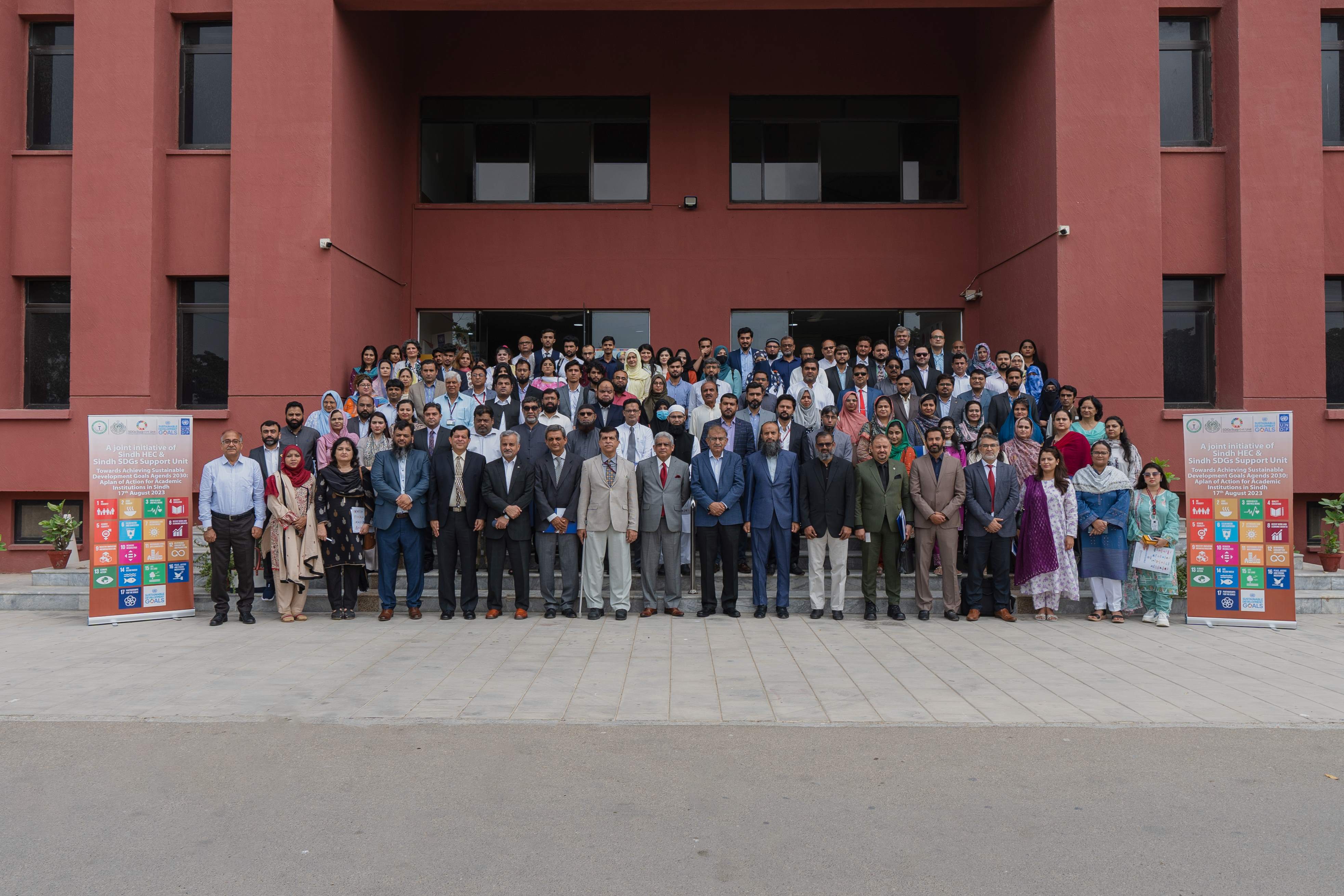
Policymakers and authority figures from diverse fields deliberated upon the steps to achieve sustainable development goals in Sindh. They converged at the workshop organized by HEC Sindh and UNDP in partnership with the Institute of Business Management (IoBM) on Thursday, August 17, 2023. The event was coordinated by IoBM’s Quality Enhancement Cell (QEC). High-ranking decision makers, dignitaries, and officials from Sindh HEC and Sindh SDGs Support Unit, UNDP attended this event. The speakers explored the initiatives and measures educational institutions in Sindh should implement to meet the SDGs.
During his Welcome Address, Talib Karim, President IoBM said that the Institute has been contributing to the SDGs through research. He appreciated Sindh HEC’s efforts to organize workshops to facilitate academia’s research objectives and governance. He was hopeful that the workshop will add value to our collective knowledge. Universities should share best practices and conduct cross-departmental learning initiatives, he added. Dr. S.M. Tariq Rafi, Chairperson, Sindh HEC called for universities to move towards the completion of goals. Sindh HEC has initiated faculty-building workshops along with other capacity-building and research-based programs that will be beneficial in this regard. We must improve skills and impart knowledge among the students, he added. Knowledge-sharing must be encouraged among and between private and public sector universities.
The Sustainable Development Goals (SDGs) that are achieved through collaborative efforts between IoBM, UNDP, and Sindh HEC highlighted below:
• SDG 4: Quality Education: The focus on enhancing educational institutions through workshops and research initiatives, as well as the emphasis on building faculty capacities, directly relates to SDG 4, which seeks to ensure inclusive and equitable quality education for all.
• SDG 17: Partnerships for the Goals: The collaboration between IoBM, UNDP, Sindh HEC, and various stakeholders highlights the importance of partnerships in achieving the SDGs. These partnerships are essential to mobilizing resources, sharing knowledge, and achieving sustainable outcomes.
The workshop, through academic and policy collaborations, plays a crucial role in aligning Sindh’s educational initiatives with global SDG targets. The provincial review of SDGs and action plan development are practical steps towards realizing these goals in Sindh.
Ahmed Hasan, Monitoring and Evaluation Specialist, Sindh SDGs Support Unit called for the academia, private and the public sector to work in unison with UNDP to implement SDGs. He also presented a provincial review of SDGs in Sindh including an overview of the public expenditure and key achievements. Munib Ali Faridi, Environmental Policy Analyst, UNDP, conducted a group session on developing an SDG Action Plan. Dr. Zulfiqar Ali Umrani, Director ORIC, Ziauddin University discussed the methods for implementing SDGs and how universities evolve through the process of knowledge transfer, creation, implementation, and integration. Aijaz Ali Khuwaja, Planning Consultant SDG, UNDP examined the achievability of SDG indicators. He explained how political commitment, policy coherence, and institutional development can help the realization of SDGs in Sindh. Shehzer Amir Shaikh. Economic Policy Analyst, UNDP presented the vote of thanks. Rector IoBM Dr. Tariq Rahim Soomro distributed the certificates and souvenirs during the closing ceremony.